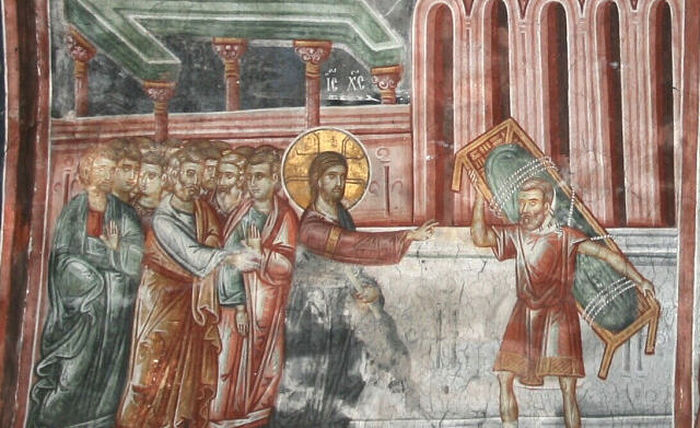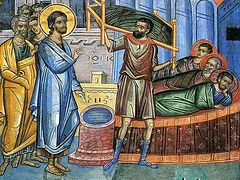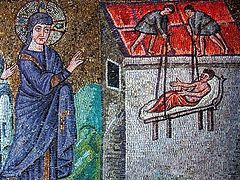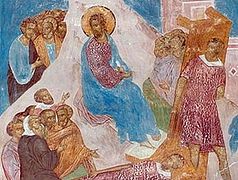In these [porches] lay a great multitude of impotent folk, of blind, halt, withered, waiting for the moving of the water (Jn. 5:3).
It’s no surprise that there were many sick people at the Pool of Siloam[1]: The power of God was at work in it, but its activity was quite limited. Not many angels came down to the font, only one: “The angel of the Lord” (Jn. 5:4). And this one angel descended not every day, but only once a year, every summer. And descending once a year, he didn’t go to all the channels of the Pool of Siloam, but only the main one: The angel went down … into the pool (Jn. 5:4). Moreover, not everyone who descended into the pool after the disturbing of the waters received healing, but only whoever made it first: Whosoever then first after the troubling of the water stepped in was made whole of whatsoever disease he had (Jn. 5:4).
But is it possible, brethren, not to marvel when we find many sick at the Christian font, at the font of grace, of which the Pool of Siloam was but a weak image? Here we have not one angel, but an entire host of the purest spirits, the Son of God Himself, and the Holy Spirit descend to Earth to bring healing to the suffering; here it’s not one pool that offers healing, but, we can say, as many fonts as there are diseases and diseased people; here the fount of life opens up not once a year, but having once flowed from the side of the pierced Redeemer, it flows throughout all time and ages. Here it’s not only he who comes to the font of healing first who receives his health, but everyone, from the first to the last, whoever and whenever they come. Meanwhile, if the number of those healed can be approximated according to the abundance of those who receive healing, then the Christian font heals fewer sick people than the Pool of Siloam.
Why is that? Why do the rivers of grace poured out on us not bring us spiritual health, while one drop is enough for fonts of water flowing unto life eternal to open up inside us? Can we, like the paralytic, say: Sir, I have no man, when the water is troubled, to put me into the pool (Jn. 5:7)? But there are many spiritual doctors and assistants at the font of grace; and God Himself, having built it, plunges the afflicted into it. Moreover, dare we, like the paralytic, to say that we came to it but didn’t receive healing? But to say so would be to deceive ourselves; it would be to regard as a liar God Himself, Who said that if we confess our sins, He is faithful and just to forgive us our sins and to cleanse us from all unrighteousness (1 Jn. 1:9). On the contrary, we undoubtedly must say that many of you have been told by the Heavenly Physician, and, perhaps, more than once: Rise, take up thy bed, and walk (Jn. 5:8), and yet you continue to lie thoughtlessly in your sins! So, what’s to blame for the fact that the almighty power of grace can’t heal our spiritual ailments? The fault for this, brethren, lies with us, with our unwillingness.
“But is it possible that any of us would not really want our salvation and condemn ourselves to the spoils of hell? By the grace of God, we have yet to reach such bitterness.” Indeed, brethren, we haven’t yet reached such a destructive state. We desire to be saved; and if each of us, like the paralytic, were offered by the Heavenly Physician: “Do you want to be healthy?” (Jn. 5:6), then, undoubtedly, every one of us would answer: “Lord, I do!” But would we all be answering truthfully? How many there would be who while not pretending to deceive the Almighty, nevertheless deceive themselves! Ah, we nowhere deceive ourselves so much as in the matter of our own salvation, while deception is nowhere so disastrous as in this matter! Whoever sincerely desires his own salvation does everything that serves for his salvation. Whoever sincerely desires his salvation distances himself from everything that hinders the work of salvation. These two signs are as true as they are simple. Let us use them for our edification.
1. Whoever sincerely desires his own salvation does everything that serves for his salvation.
The example of the paralytic is the most convincing proof of this truth. Laid out for more than half his life on his sickbed, which stole everything from him except the desire for health, abandoned by all people and every member of his body, he gathers his last remaining strength to sacrifice them to the desire for life; he rises from his bed of thirty-eight years, and brings himself to the healing pool. He has already reached the limit of his short and yet long path; he already notes the signs of the coming troubling of the water; he’s ready to plunge himself into the pool—and suddenly he sees that healing has been anticipated by another! What a temptation for a man for whom it was more taxing to pass through the five porches of Siloam than for another to go around all the cities of Judea! But he who is paralyzed in body isn’t exhausted in spirit: Every year he is subjected to the same temptation, and every year he comes to the pool. Isn’t it obvious, brethren, that he sincerely desired healing, given that he did everything he could for it?
Do we do this? Do we do everything we can for our salvation? We’re unable to do truly God-pleasing works by our own efforts, much less uproot the sin that lives in us, but we can long for the liberty of the children of God, entreating the Heavenly Father that our souls be led out of the prison of sin. We can, through fidelity to the remnants of natural light, make ourselves capable of receiving the grace of God. Moreover, after receiving it, we can and must work together with it to perfect ourselves in virtue, to stir up the gift of God, which is in ye (2 Tim. 1:6), by warm prayer, reading the word of God, and speaking with people who have succeeded in the spiritual life. Forgetting those things which are behind, and reaching forth unto those things which are before (Phil. 3:13), we can and must seek the biggest and best gifts (1 Cor. 12:31), thoroughly furnished unto all good works (2 Tim. 3:17), always accomplishing more in the work of the Lord (1 Cor. 15:58), seeking ways to accomplish whatsoever things are honest, whatsoever things are just, whatsoever things are pure, whatsoever things are lovely, whatsoever things are of good report (Phil. 4:8), which constitutes virtue and praise.
Do we take advantage of this precious opportunity? Do we nourish within ourselves the sincere desire to become better than we all are by nature? Do we try to be above reproach before the court of conscience and do we observe its purity? Do we courageously go out to fight against vice, and do we not concede victory to them without putting up a fight? Do we plead God for help and do we use the means given to us for our salvation correctly? Are we zealous about reading the word of God and do we try to correct the shortcomings that we notice in ourselves when we look into this mirror of truth? Do we often enter into our inner cell to confess our transgressions before the Heavenly Father, and do we always close the doors behind ourselves? Are we filled with joy when they tell us: Let us go into the house of the LORD (Ps. 121:1), and we do we enter it with a contrite heart and humble spirit? Do we imitate the saints of God and find pleasure in speaking with them? Do we rejoice when we find an opportunity to help suffering mankind, and do we grieve when we can’t comfort a distressed brother with anything but wishing him help from above?
The life of the man whom all this happens to can, brethren, in no way resemble the lives of those who prefer tranquility; he looks at everything earthly in relation to the Heavenly, seeking the invisible, the eternal in everything visible. He’s ready to give up everything and consider everything as dung so as to acquire or not lose Christ. His first and last thought is given to eternity, his first and last desire— his perfection in virtue. His most pleasant moments in life are when he can freely indulge in reflection or conversation about the blessedness of his Heavenly brethren; his most sorrowful moments in life are when he feels no inner draw to Heaven. He’s not troubled by any vicissitudes of life except those in which his salvation or that of his fellow men is in danger. He judges the happiness and misfortune of his neighbors, their worthiness and unworthiness, not by their success in worldly affairs, but by their success in works of love and self-sacrifice. He responds to pleasures themselves with longing for the Heavenly fatherland; those very dreams represent the holy images of the hopes of the heart; in short, his life is a visible preparation for the better life, for the future sojourn with God.
Is this what our life is like, brethren? If so, then we sincerely desire to be saved. We can boldly knock on the door of Divine mercy and we can be completely sure that we won’t hear: I know you not (Mt. 25:12). But if not, then judge for yourself if you can sincerely desire your salvation and not do what serves for salvation? Meanwhile, brethren, how many of us are there whose consciences must say in this case: “Our lives are not like this! They’re not like this!”
2. Whoever sincerely desires his salvation distances himself from everything that hinders the work of salvation.
“Look,” the Apostle Paul once told the Corinthians, look at the disgrace (1 Cor. 1:26-27). What do those who are laboring for it not deny themselves, what do they not abstain from in order to make themselves more capable of achieving the crown of victory? Meanwhile, what kind of crown is this that people give up everything to achieve? A perishable crown that often fades before it adorns the head of the victor. If, the Apostle continues, they refrain from everything in order to receive a corruptible crown, is it not possible for us who labor to receive an imperishable crown to also refrain? Is this Apostolic teaching being fulfilled in us, brethren? Do we separate ourselves from everything that can hinder our salvation? We know that everything in the world is the lust of the flesh, and the lust of the eyes, and the pride of life, that if any man love the world, the love of the Father is not in him (1 Jn. 2:16, 15), that love for the world is enmity with God (Jas. 4:4). Do we follow the advice of the Apostle: Love not the world, neither the things that are in the world (1 Jn. 2:15), to neither do nor say anything worldly? We know that flesh and blood can’t inherit the Kingdom of God, that the law of the flesh is in every way opposed to the law of the spirit, that pleasing the flesh leads to the captivity of sins. Do we crucify our flesh with its lust and passions (Gal. 5:24)? Do we “mortify our members which are upon the earth” (Col. 3:5)? Do we find pleasure in infirmities, in reproaches, in necessities, in persecutions, in distresses (2 Cor. 12:10), which, afflicting the flesh, enrapture our spirit?
We know that by speaking with a depraved person we ourselves can become depraved; that depraved conversations can spoil even the best morals. Do we turn away every brother who behaves scandalously, do we withdraw from the assemblies of evil and depraved people, do we flee the ways of the wicked and the seat of the pestilent (Ps. 1:1)? We know that mental dispersion, serving as an obstacle to success in worldly affairs, all the more harms success in works of piety, because whoever has eyes roaming to the ends of the Earth can be whole neither in heart nor mind. Do we turn away from worldly noise, do we avoid those instances where we could face the danger of losing sight of our duty, our conscience, and our salvation? Do we flee like David into the wilderness of the heart, to await salvation from the Lord there? (Ps. 54:8-9). We know that the passions are the most dangerous enemies of virtue, that a man possessed by them is like a wave on the sea, lifted and broken by the wind. Do we block their entrance into our heart, or do we drive them out if they violently invade it?
The sun will not set, brethren, upon the anger of one who does all of this (Eph. 4:26), who is ready to say to even the most moderate entertainment: “What are you doing?” (Ecc. 2:2). Such a person not only doesn’t complain about the laws of abstinence and deprivation prescribed by the Church, but he rather applies them to all the needs of his body, and by his own example tries to prove their importance and defend them from severe criticism. With all his condescension to the flesh, he never ceases to look at it as lazy dust encumbering the active spirit; and honoring in it the future co-heir of eternal glory, he vigilantly pursues the true traitor in battle. He doesn’t first enter into a union of affection and friendship with anyone, as he is completely convinced that he can share not only earthly things with him, but even more so Heavenly hopes, and immediately terminates it as soon as he notices that those with him have begun to love the glory of men more than the glory of God. The entire world with all its charms represents a dismal country of exile for such a man. All earthly goods are under such a man’s suspicion, for he knows that the most innocent of them have ruined many people forever. In brief, throughout his entire life, such a man gradually distances himself further from the vanity of the world, gradually strengthening his triumph over sensuality.
Is our life like this, brethren? If so, then we truly desire our salvation and undoubtedly, we will soon hear that desired voice: Rise, take up thy bed, and walk (Jn. 5:8). If not, then no matter how much we talk about desiring salvation, we have no such desire. For, judge for yourselves whether it’s possible to desire salvation and not withdraw from that which hinders the work of salvation. Meanwhile, brethren, how many of us must speak our conscience in this case: Our life is not this way! It’s not this way!
So what is our life like? Do we at least do for Heaven what we do for Earth? Do we do for our salvation what we do for our health, to heal ourselves from sicknesses, to acquire honors and riches, to keep the favor of those who are higher than us, to bring ourselves momentary benefits, temporary pleasures? A shameful comparison! But, meanwhile, the consequence of this is perhaps more shameful for many of us—some of us will hardly be able to keep from speaking our conscience in this case: We don’t, we don’t do all this! Are we at least doing something for our salvation? Without a doubt, brethren, each of us is doing something for it, but how many there are whose “something,” were we to investigate it strictly and impartially, would turn into nothing! What are we doing? Whatever we do, if it isn’t for God, then it’s for His enemy, for our destruction, for hell!
Meanwhile, what do we desire and what do we seek? Heaven, eternity, God!... Ah, can we, brethren, with our spiritual inactivity, even name the majestic objects of our desire without feeling some shame? We love to mock those who, in order to achieve some important worldly enterprise, use small and illegitimate means, and call them dreamers, reckless people. And what should they call us who hope to receive the whole of Heaven from the Heavenly Judge as a reward for the kind of work that earthly judges wouldn’t consider worthy of rewarding with even a small piece of land? The ancient defenders of Christianity reproached the pagan sages for demanding a lot from people while promising too little; can’t today’s pagans reproach many Christians for promising themselves everything while demanding nothing of themselves? Is it any wonder after that if some people in our times have doubted the very existence of Heavenly rewards? Ah! The shameful coldness towards Heaven of Christians themselves, for whom Heaven exists, can make anyone ask whether Heaven exists. Is it any wonder that some people doubt in the action of grace itself on the human heart? Receiving this Divine power in vain, concealing it without any fruit and, as it were, annihilating it within ourselves by our complete neglect of it, we necessarily pave the way for doubting in its activity and very existence. Thus, our weakness and inactivity in the work of salvation is the reason why the Godhead itself seems to be inactive in the eyes of pernicious people! Thus, because of our abuse, the treasure of grace sent down to us for the redemption of eternal wealth not only doesn’t enrich us, but serves as a reason to make accusations of poverty against Him Who sends it down!
What do you think, brethren: Can the gifts of grace come as a result of this abuse? The Just One won’t punish us, like the ancient Israelites, by averting His face from us; He won’t cover Himself with a cloud so that our prayer doesn’t reach Him; He won’t take our prophets and leaders from us; He won’t send us a famine of His word, but will leave us the very Body and Blood of His Son; but He will take His grace away from us! Then our very prophets will proclaim vain things to us (Lam. 2:14); then we’ll pray, and our prayer, without cleansing our sins, will itself turn into sin (Ps. 108:7). Let us read or hear the word of God, and instead of the savour of life we will begin to smell in it the savour of death (2 Cor. 2:16). Let us eat the Flesh and drink the Blood of Christ, and this food of salvation will serve only unto judgment and condemnation for us. Then—it’s terrible to think!—the very rays of Heavenly mercy will help only to ensure that we, like the fruits of anger, become ripe for eternal destruction! I know, brethren, that many of us don’t wish to hear such threats from this sacred place now. But if we want them to, they can save us. They are important; they will be very important before the Throne, surrounded by the clouds of angels—but they won’t save any of us then. So, until the font of grace ceases to be stirred through the merits of our Intercessor, let us gather the last remnants of spiritual strength in order to draw near to it, and throw the burden of the sins that overwhelm us into it. Amen.




